What are digestive enzymes, and why are they frequently used on the gut healing journey?
Oh, Instagram
Last week on Instagram, someone sent me an oh-so-thoughtful private message (insert sarcasm) that went like this,
At this point I’m going to have to unfollow. I’m sorry but you are sending out so much misinformation into the world especially people with autoimmune diseases. Probiotics do not work. Kombucha is packed with sugar which causes inflammation. You get my drift. I’m sad for people who think this BS will work for them. People should be getting food sensitivity tests and working with real doctors.
Before you ask, no, no she was not some troll at all. She was a normal, respectable woman.
I appreciate her thoughts and feedback. However, of course I publicly responded to that because I disagreed with the thoughts 101%.
In fact, I even laughed at her final statement that “people should be getting food sensitivity tests and working with real doctors.”
While I’m a fan of the food sensitivity testing, they are by no means accurate in the ways people think they are. Those tests, mostly, help you understand if you have leaky gut or not.
They do NOT definitively let you know if there is something severely wrong with.
A topic for another day.
Anyways, how does this relate to the question,
What are digestive enzymes?
Because digestive enzymes, like booch and probiotics, will always be subjective even if the research is there.
So with that – either continue with me on this journey or don’t.
I strive to give you everything I can, in the most real and honest way possible.
What are Digestive Enzymes?
Click HERE to save this post for later.
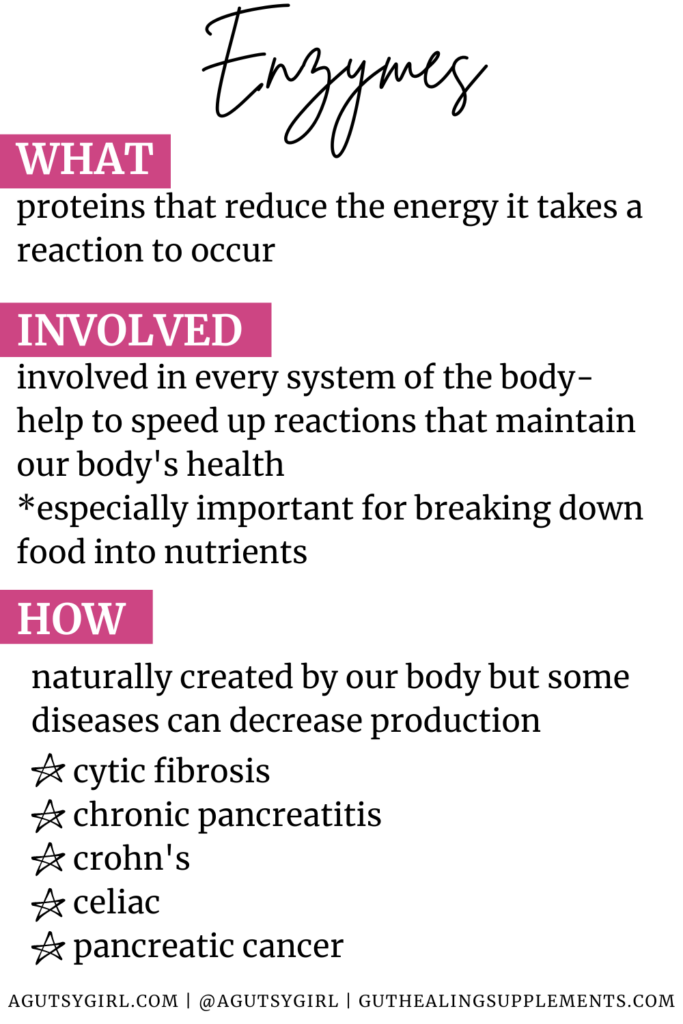
“Digestive enzymes” is a broad term that includes pancreatic enzymes, plant-derived enzymes and fungal-derived enzymes.
The body naturally produces them, but with age and health issues they decrease.
Some of these common health issues include:
- Cystic fibrosis
- Chronic pancreatitis (inflammation of the pancreas)
- Crohn’s disease
- Celiac disease
- Pancreatic cancer
Especially in those cases, having the necessary amount of enzymes is critical. They help break down the foods eaten into nutrients, which will become absorbed by the body. (This is essential because most key nutritional components are too complex for immediate absorption.)
Digestive enzymes help turn larger molecules found in foods (carbs, protein and fats) into more easily absorbed particles (such as amino acids, fatty acids, cholesterol, simple sugars and nucleic acids).
The body can then actually use these particles to function and for energy.
Ingredients contained in digestive enzyme supplements
There could, literally, be anything contained in your enzyme supplement.
But here are some of the things you might find and what they are for.
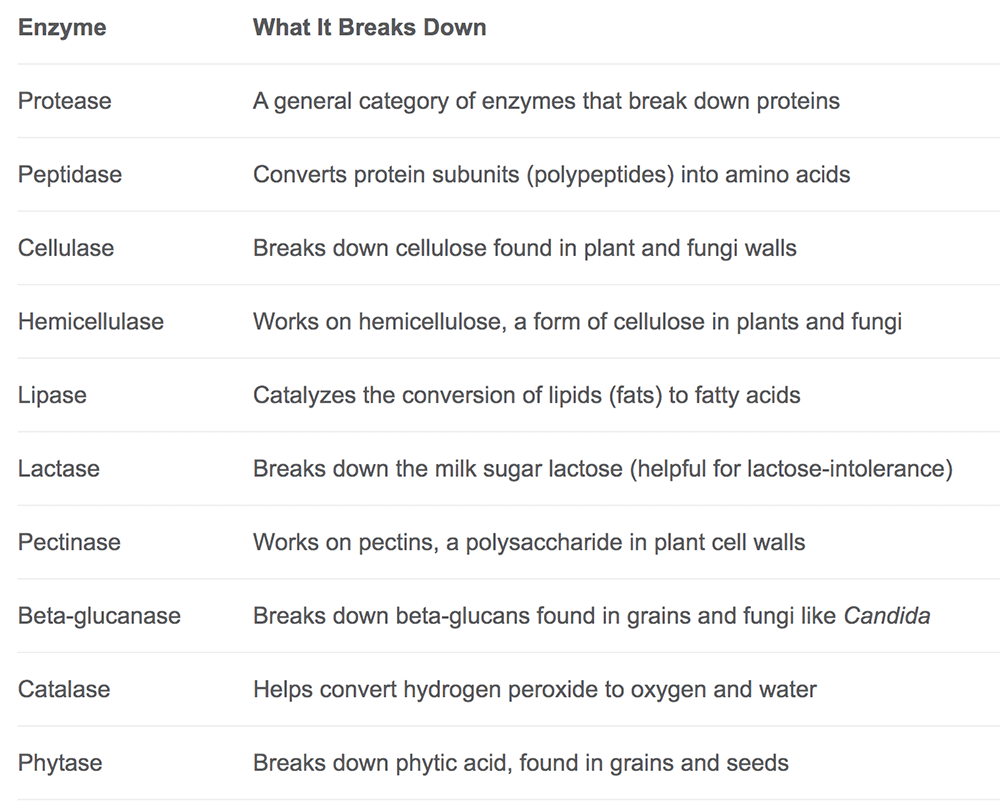
Other Digestive Enzyme Ingredients
Amylases
Amylases’ main function is to hydrolyze the glycosidic bonds in starch molecules, converting complex carbohydrates to simple sugars. (source)
Betaine HCL
I’ve written about it in depth HERE
Glucoamylase
an important digestive enzyme that helps us absorb nutrients and create energy from some of the most common plant foods that we eat.
It does this by breaking down the starch that occurs naturally in most vegetables that we eat.
Invertase
an enzyme that catalyzes the hydrolysis (breakdown) of sucrose (table sugar) into fructose and glucose
Ox Bile
acts as a detergent to make the fat in food more soluble and therefore easier to digest
Pepsin Complex
an endopeptidase that breaks down proteins into smaller peptides (oftentimes found in HCL aka HCL with Pepsin)
What to look for in a digestive enzyme supplement?
First, let it be clearly stated,
Enzyme supplementation therapy may play an important role in several digestive and malabsorption disorders, such as EPI and lactose intolerance. (source)
However, it’s hard to know the exact digestive enzyme you might need without knowing your specific situation.
That said, digestive enzymes are broken down into three classes:
- lipases (needed to digest fat)
- proteolytic enzymes (needed to digest protein)
- amylases (needed to digest carbohydrates)
And these three things are critical in your enzyme. Any digestive enzyme I’ve ever taken contained them.
Break Down
Break Down is the digestive enzyme from A Gutsy Girl’s supplement line.
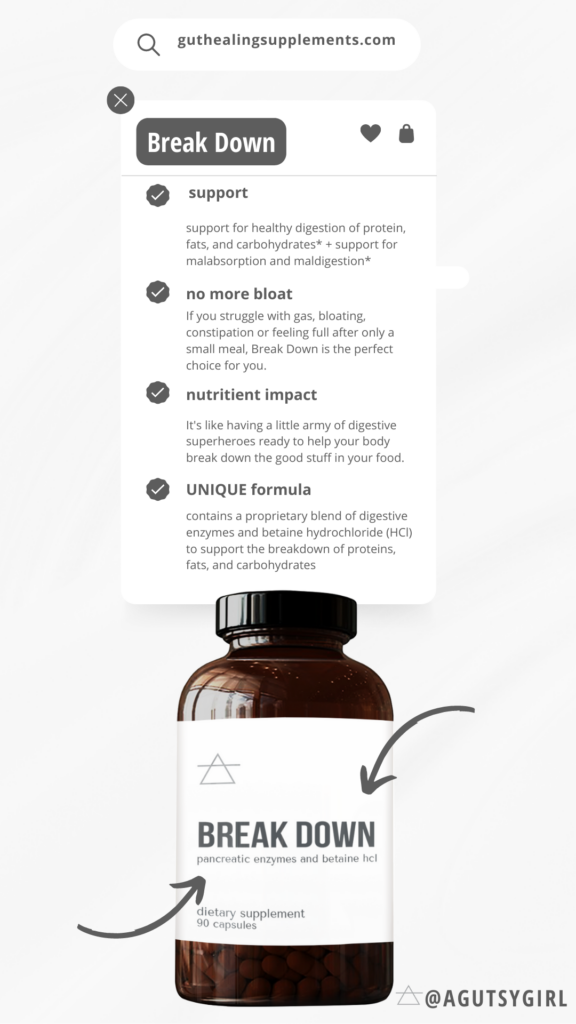
Units of Measurement for Digestive Enzymes
There are different ways digestive enzymes show the amount of ingredient contained.
Here is a good place to start for reference:

Additionally, you might see:
- Cellulase – CU (Cellulase unit)
- Invertase – IAU (Invertase Activity unit)
- Lactase – LacU (Lactase unit)
- Maltase – DP (degrees Diastatic power)
- Mg – a common unit of measurement
Did You Know? Prescription Enzymes.
There are also prescription enzyme medications. They contain pancrelipase, a mixture of the digestive enzymes amylase, lipase, and protease. Prescription enzymes also contain a special coating on the pill so it will survive stomach acid and make it to the small intestine.
These prescriptions include:
- Creon
- Pancreaze
- Pertzye
- Ultresa
- Viokace
- Zenpep
These prescriptions are typically made from the pancreases of pigs, and are regulated and approved by the FDA.
But by the way, that’s not to say that non-prescription ones don’t and won’t survive. I’ve never taken a prescription enzyme, and still thrive!
What foods contain natural digestive enzymes?
I already know the question, so I have your answer.
What if I don’t want to take another supplement? Do any foods contain natural enzymes?
The answer is “yes.”
Click HERE to save this list for later.
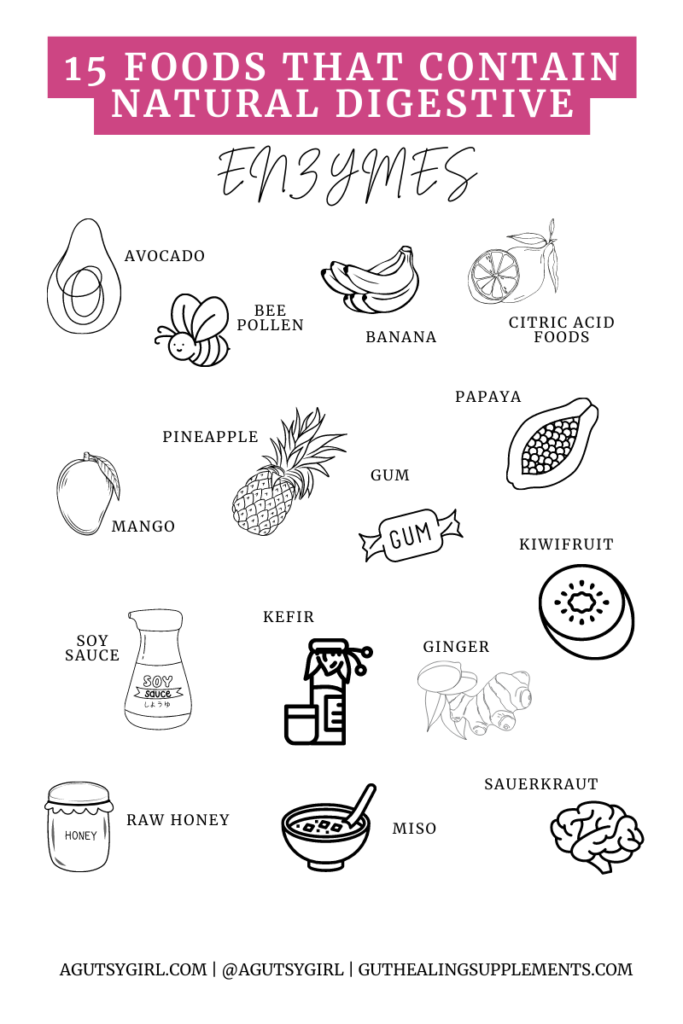
Here are 15 foods that contain natural digestive enzymes:
- avocado
- bee pollen
- banana
- citric acid foods (in general)
- mango
- ginger
- gum (the act of chewing it), but choose a high-quality one
- papaya
- pineapple
- soy sauce and tempeh (fermented soy products)
- kiwi
- raw honey
- miso
- kefir
- sauerkraut

Do Digestive Enzymes have any Negatives?
Like everything else, of course. The opposition says things like,
- The FDA does not regulate the over-the-counter ones. Therefore, you can’t be sure what the pills are really made of or the exact amounts of enzymes they may contain. “It’s buyer beware,” warns Dr. Staller.
- With common gut problems, like heartburn or irritable bowel syndrome, there is little evidence that digestive enzymes are helpful.
- Could have gastrointestinal cramping and/or diarrhea.
- Some argue that people become too dependent upon them and it’s hard to tell whether real gut healing has occurred.
If you have a serious illness, be sure to research it as it relates to digestive enzymes as well.
My Personal Experience, Thoughts, and Recommendations on Digestive Enzymes
All the information, on both sides of the coin, has been presented above. You must work with your own doctor and/or practitioner to figure out what will be best and most effective for you.
In my own experiences, though, enzymes were not only helpful but critical on the journey.
I have been very up front and honest with the digestive enzymes I have taken now (and over the years).
I have been talking a lot about stomach acid lately (because it was critical for me).
Thus, when we released our own Digestive Enzyme, I made sure to include it as part of the formulation.
I do not take digestive enzymes with every morsel eaten anymore. This is because:
- I don’t need to, and
- It’s true – you must address your real gut issues instead of relying on a supplement or medication to solve the problem(s)
But I do take them whenever I’m eating complex meals still…..because it’s part of my minimalist approach to (what will likely be) lifelong supplements.
And it works impeccably well for me!
Very Important Note on Digestive Enzymes
When it comes to dosing and/or whether or not you use digestive enzymes on your gut health and healing journey, please remember to consult with someone other than the Internet and this blog.
I’m very serious about this. I do the research, and provide a plethora of information, but anything that requires supplements and/or medications needs customized, in-person, professional help.
I’m not a doctor and I don’t play one on the Internet.
Sources: HERE, HERE, HERE, HERE, HERE, HERE, and HERE.
If you liked this post, you might also enjoy:
Are you ready to go on your own gut-healing journey? Feel free to start HERE with the FREE 3-day gut reset.
Xox,
SKH
🤰 bloating be gone! weight loss through optimal gut health for women
💃ʜᴇᴀʟ ʏᴏᴜʀ ɢᴜᴛ. ʜᴇᴀʟ ʏᴏᴜʀ ʟɪfe.
🫶🏻 founder gutbyome.com






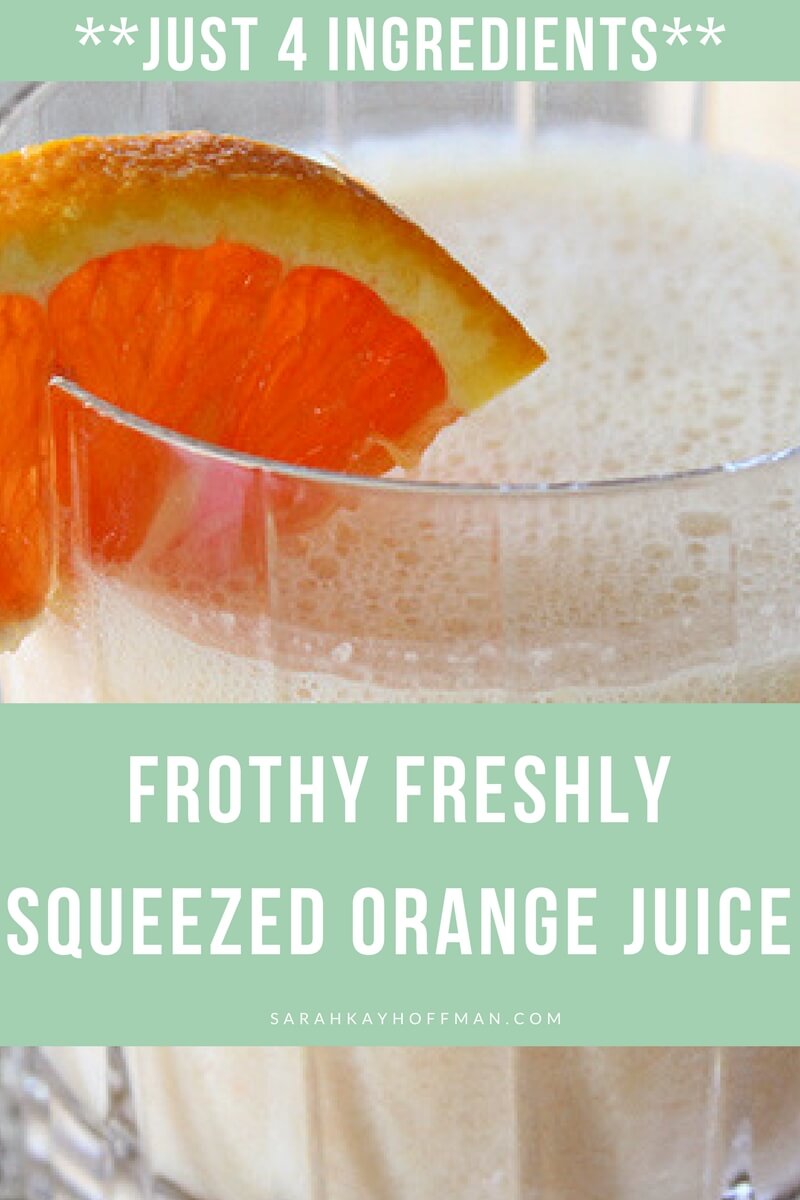
Will excess trapped gas and bloating (and associated pain) be improved by faster gut motility?
Yes, that would definitely help likely.
Hi! I just started taking the enzymes. I’ve become very naseaus. Is this a normal response to these? I have gastroparesis according to my Dr.’s. Have been quite sick. I’m being tested for Cushings disease now. Also a Type 1 diabetic. Have had Gpoem surgery and Botox in stomach and was on a JTube. I eat what I can when I can which isn’t much.
Hi Pam – which enzymes?